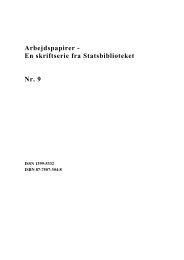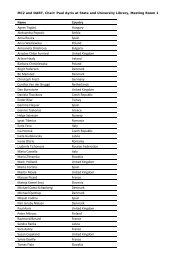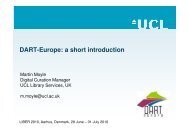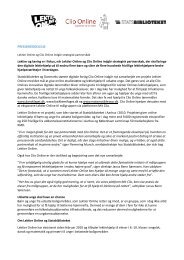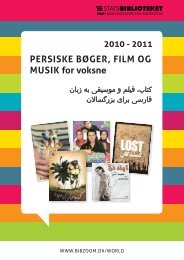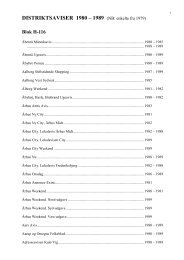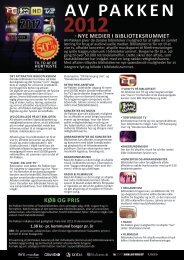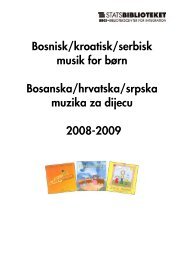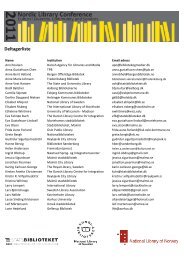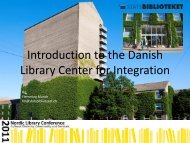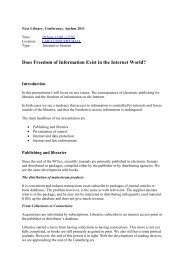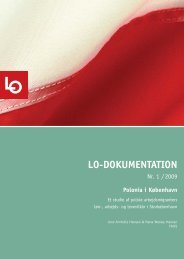LIBER 39TH ANNUAL CONFERENCE - Statsbiblioteket
LIBER 39TH ANNUAL CONFERENCE - Statsbiblioteket
LIBER 39TH ANNUAL CONFERENCE - Statsbiblioteket
You also want an ePaper? Increase the reach of your titles
YUMPU automatically turns print PDFs into web optimized ePapers that Google loves.
PREsEntatIon By ouR sPonsoR<br />
RafaEL sIdI (ELsEvIER, usa):<br />
LEvERagIng tEchnoLogy to<br />
tRansfoRm thE scIEntIfIc<br />
LandscaPE<br />
The open data trend allowing the proliferation<br />
of applications consumers use on<br />
a daily basis (i.e., Flixster, Urban Spoon,<br />
etc.) is now crossing over to the scientific<br />
community, creating a significant opportunity<br />
to enrich content and speed innovation.<br />
Simultaneously, the availability to<br />
access and connect raw data is emerging<br />
as a critical component to fuel scientific<br />
discovery as research becomes even more<br />
multidisciplinary and collaborative.<br />
Through thousands of interviews with<br />
researchers and industry influencers, it’s<br />
clear there is an opportunity to create an<br />
environment that empowers the scientific<br />
community to maximize the potential<br />
benefits of research-driven applications to<br />
search and discovery. The unprecedented<br />
approach would alter the relationship between<br />
scientific information and the way<br />
it is discovered, used, shared and re-used<br />
for scientific breakthroughs.<br />
As the scientific community experiments<br />
and builds innovative applications to<br />
leverage available data and deliver<br />
“intelligent information” through innovative<br />
applications, content consumption<br />
will be fundamentally changed. Microcommunities<br />
designed around information<br />
and applications in which users help each<br />
other curate will evolve and transform<br />
into trusted networks for researchers to<br />
filter and view information. As this new<br />
scientific knowledge ecosystem flourishes,<br />
it will create the building blocks that<br />
capture existing knowledge on any given<br />
subject and serve as the foundation for<br />
new discoveries.<br />
Universities, commercial and government<br />
institutions will be crucial in encouraging<br />
researchers to develop new applications.<br />
Within these institutions, it is the librarians<br />
who have the greatest opportunity<br />
to champion the cause as the influential<br />
gatekeepers of research.<br />
This presentation will delve into the power<br />
and benefit of generating tailored applications<br />
for scientific researchers focused<br />
on improving the search and discovery<br />
process, as well as the steps required from<br />
all parties – librarians, researchers, publishers<br />
and platform providers – involved<br />
to make these applications a reality.<br />
Rafael sidi is Vice President, Product<br />
Management at ScienceDirect at Elsevier.<br />
Currently he is in charge of online product<br />
development for ScienceDirect platform<br />
and new initiatives related to knowledge<br />
discovery. He has been with Elsevier since<br />
2001, and he has been instrumental<br />
in developing Engineering Village and<br />
launching illumin8. He was also the<br />
publisher for the Compendex database.<br />
Before joining Elsevier Rafael was Director<br />
of e-commerce operations at Bolt, a teenage<br />
social networking portal. Rafael holds<br />
an MA from Brandeis University and a<br />
BS in electrical engineering from Bogazici<br />
University in Istanbul, Turkey.<br />
30 JunE 2010<br />
53



